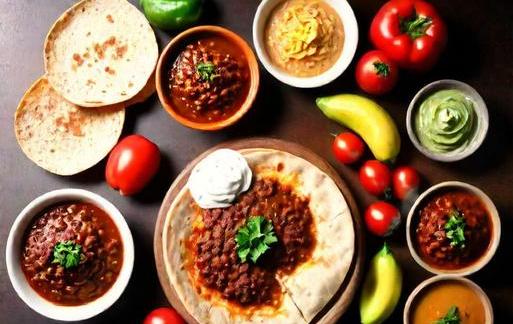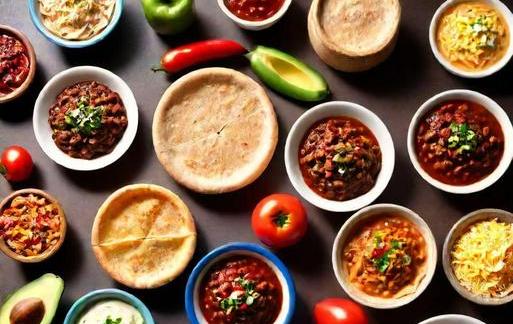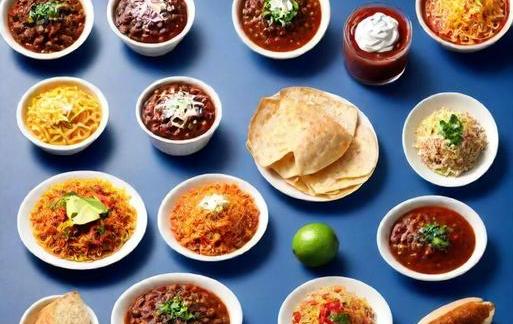- You are here:
- Home »
- Food
- » [REVEALED] Hispanic Foods That Start With Z
[REVEALED] Hispanic Foods That Start With Z
Note: This page contains affiliate links.
As an Amazon Associate, I earn from qualifying purchases when you click on the link, but you are not charged extra.
The Hispanic culinary landscape is a rich tapestry of flavors, aromas, and traditions that have captivated the taste buds of food enthusiasts around the world. In this gastronomic journey, we delve into the lesser-explored realm of Hispanic foods that start with the letter Z. From traditional staples to hidden gems, this article uncovers the diverse and delectable world of Hispanic cuisine.
Contents
List Of Hispanic Foods That Start With Z

1. Zarzuela De Mariscos
Zarzuela de Mariscos is a sumptuous seafood stew that hails from the coastal regions of Spain. This flavorful medley typically includes a variety of shellfish such as mussels, clams, and shrimp, cooked in a rich tomato and wine broth. Infused with aromatic herbs and spices, Zarzuela de Mariscos is a celebration of the bounty of the sea.
2. Zarape
Zarape, also known as Serape, is a colorful and vibrant Mexican blanket that often doubles as a tablecloth or decoration. While not a food item per se, the Zarape plays a symbolic role in Mexican culture, adorning tables during feasts and celebrations. Its bold patterns and hues reflect the lively spirit of Hispanic festivities.
3. Zamorano Cheese
Zamorano Cheese is a Spanish cheese originating from the province of Zamora. Made from raw sheep’s milk, this cheese undergoes a meticulous aging process, resulting in a firm texture and a robust, nutty flavor. With its distinct crisscross pattern imprinted on the rind, Zamorano Cheese is a testament to the craftsmanship of traditional Spanish cheesemaking.
4. Zacahuil
Zacahuil is a monumental dish in Mexican cuisine, often reserved for special occasions and large gatherings. This oversized tamale originates from the Huasteca region and is prepared by stuffing a massive corn masa casing with a flavorful mixture of meats, chilies, and spices. The sheer size of Zacahuil makes it a spectacle, embodying the communal and celebratory spirit of Mexican culinary traditions.
5. Zarangollo
Zarangollo is a delightful Murcian dish with humble origins. This simple yet flavorful concoction features sautéed zucchini, onions, and eggs, creating a harmonious blend of textures and tastes. The dish is seasoned with a touch of olive oil and salt, showcasing the beauty of uncomplicated ingredients prepared with skill and care.
6. Zurracapote
Zurracapote is a traditional Spanish beverage that warms the soul, especially during the festive season. This mulled wine, originating from the region of La Rioja, is infused with a mix of fruits, spices, and sugar. The aromatic blend is heated to perfection, creating a comforting elixir that embodies the essence of Spanish winter celebrations.
7. Zamburiñas
Zamburiñas are a delectable Galician delicacy, showcasing the bounty of the Atlantic Ocean. These small, tender scallops are typically grilled or broiled, allowing their natural sweetness to shine through. Often served with a drizzle of olive oil, garlic, and parsley, Zamburiñas are a testament to the Galician commitment to showcasing the purity of fresh seafood.
8. Zacatecas-style Gorditas
Zacatecas-style Gorditas offer a taste of the culinary delights from the Mexican state of Zacatecas. These thick, handmade corn tortillas are stuffed with an array of savory fillings, such as slow-cooked meats, beans, cheese, and fresh salsa. The gorditas are then griddled to perfection, creating a crispy exterior that gives way to a flavorful and satisfying interior.
9. Zarangollo Murciano
Zarangollo Murciano is a regional specialty from the southeastern province of Murcia in Spain. This dish features a harmonious blend of zucchini, onions, green peppers, and eggs, all sautéed together to create a flavorful medley. Seasoned with a touch of salt and pepper, Zarangollo Murciano exemplifies the simplicity and authenticity of Murcian cuisine.
10. Zuppa Inglese
Zuppa Inglese, while its name suggests English origins, is an Italian dessert that has found its way into Hispanic culinary repertoires. This layered trifle-like dessert consists of sponge cake or ladyfingers soaked in liqueur, alternated with layers of custard and chocolate cream. In many Hispanic regions, especially those with a strong Italian influence, Zuppa Inglese has become a beloved treat for special occasions.
From the coastal kitchens of Spain to the vibrant streets of Mexico, Hispanic foods that start with the letter Z offer a diverse array of flavors, textures, and culinary traditions. Each dish tells a story of cultural heritage, local ingredients, and the passion for creating meals that bring people together. Whether savoring the richness of a seafood zarzuela or indulging in the simplicity of a zacahuil, these culinary delights provide a tantalizing glimpse into the heart and soul of Hispanic gastronomy. As we explore the lesser-known corners of Hispanic cuisine, we discover a world where every dish is a celebration and every bite is a testament to the culinary artistry passed down through generations.
Significance

Hispanic cuisine is a tapestry of diverse flavors, colors, and textures that reflect the rich cultural heritage of the Spanish-speaking world. From aromatic spices to succulent meats, Hispanic foods captivate the taste buds with their unique combinations. In this culinary journey, we will delve into the realm of Hispanic foods that start with the letter Z, uncovering hidden gems and exploring the significance of these delectable dishes.
Understanding the significance of Hispanic foods that start with Z requires a broader perspective on the culinary landscape of the Spanish-speaking world. Each dish is a testament to the fusion of indigenous ingredients with influences from Spanish, African, and indigenous cultures. The letter Z in Hispanic cuisine brings forth a handful of dishes that showcase this melding of flavors and techniques.
Category-Related

Zarzuela
One of the most celebrated seafood dishes in Hispanic cuisine, Zarzuela is a Spanish seafood stew that originated in Catalonia. This flavorful dish brings together an assortment of fresh seafood, such as mussels, clams, shrimp, and fish, in a rich tomato and wine broth. The dish is seasoned with a medley of herbs and spices, creating a symphony of flavors that dance on the palate.
Zopf
While Zopf may sound more German than Hispanic, it is a braided bread that has found its way into the culinary traditions of some Hispanic communities. This bread, originating from Switzerland, has become a beloved part of breakfast and celebrations in Hispanic households. The dough is typically enriched with eggs and butter, resulting in a soft and slightly sweet bread that is perfect for spreading butter or jam.
Zarajo
Zarajo is a dish that showcases the creativity and resourcefulness of Hispanic culinary traditions. Hailing from Spain, particularly from the region of Castilla-La Mancha, Zarajo is a dish made from lamb intestines wrapped around a skewer and grilled. While it may sound unusual to some, the result is a crispy and flavorful delicacy that has become a regional specialty.
Zarape
Zarape is a traditional Mexican dish that goes beyond its culinary significance; it is a cultural emblem. The word "zarape" refers to a brightly colored shawl, and the dish takes its name due to its colorful and layered appearance. It is a type of enchilada where tortillas are filled with a variety of ingredients, such as meats, beans, and cheese, and then stacked in layers. The dish is baked until the flavors meld together, creating a savory and visually stunning meal.
Common Themes
Exploring Hispanic foods that start with Z reveals common themes that tie these dishes together, despite their diverse origins.
Bold Flavors
Hispanic cuisine is known for its bold and robust flavors, and the dishes starting with Z are no exception. Whether it’s the aromatic spices in Zarzuela or the savory richness of Zarajo, these dishes showcase the vibrant and intense flavor profiles that define Hispanic cooking.
Cultural Fusion
Many of the dishes starting with Z highlight the cultural fusion that characterizes Hispanic cuisine. Zarzuela, with its combination of seafood and Spanish seasonings, exemplifies the blending of indigenous and European influences. Similarly, Zopf’s incorporation into Hispanic culinary traditions showcases the adaptability and openness of these cultures to embrace diverse culinary influences.
Visual Appeal
Zarape stands out not only for its taste but also for its visual appeal. The colorful layers of tortillas, filled with a rainbow of ingredients, create a feast for the eyes. This emphasis on presentation is a common theme in Hispanic cuisine, where dishes are often as visually striking as they are delicious.
Interesting Facts
Uncovering interesting facts about Hispanic foods that start with Z adds depth to our appreciation of these culinary delights.
Zarzuela: A Royal Dish
The name Zarzuela has royal origins. It is believed that the dish was named after the Spanish operatic form, zarzuela, which was a favorite of King Philip V. This regal association adds a touch of elegance to this hearty seafood stew.
Zopf’s Journey To Hispanic Tables
Zopf’s journey to becoming a part of Hispanic culinary traditions is a tale of migration and cultural exchange. As Swiss immigrants settled in various parts of the Spanish-speaking world, they brought with them the tradition of baking Zopf. Over time, this braided bread became a beloved staple in Hispanic households, showcasing the dynamic nature of culinary cultures.
Zarajo: A Testament To Resourcefulness
Zarajo’s use of lamb intestines reflects the resourcefulness of traditional cooking. In times when every part of an animal was valued and utilized, dishes like Zarajo emerged, turning seemingly unconventional ingredients into flavorful delicacies.
Zarape As Culinary Art
Zarape is not just a dish; it is a culinary art form. The meticulous layering of tortillas and fillings requires skill and precision, turning the act of preparing Zarape into a creative expression. This dish stands as a testament to the craftsmanship and artistry embedded in Hispanic culinary traditions.
Conclusion
Exploring Hispanic foods that start with Z unveils a tapestry of flavors, traditions, and cultural richness. From the royal heritage of Zarzuela to the artistic presentation of Zarape, each dish tells a story of culinary innovation and cultural fusion. These Hispanic delicacies that start with Z not only tantalize the taste buds but also provide a window into the diverse and vibrant world of Spanish-speaking cuisine. As we savor these culinary delights, we celebrate the resilience, creativity, and ingenuity embedded in every bite.


